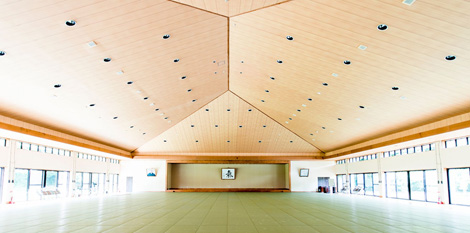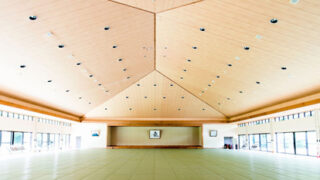When are you happy?
When you achieved your goal? When you got hold of what you wanted? When you are eating delicious food? When you are having a drink after work? You may indeed be filled with a sense of happiness at times like these.
But, if you are not happy unless something special is happening, this means you are spending more time not being happy. Koichi Tohei Sensei emphasized the importance of “happiness that we feel when we are not doing anything.”
If you are blessed with a safe environment to live and are healthy both in mind and body, that alone should be the greatest happiness. When these things become the norm, however, we become accustomed to being happy and stop feeling anything. You will no longer feel grateful, either. It is not uncommon that we only realize this after we lose something.
At Shinshin Toitsu Aikido dojos, we always bow to the front (“Shomen”) at the beginning of each class. Being able to practice like this at the moment means that we are healthy both physically and mentally, and we have the finances and time to do so. This means we are grateful to the Universe that we are able to train.
Next, we bow to our training partner. It is only with the presence of our training partner that we can practice our techniques. This means we are also grateful to our training partner that we are able to train.
“Feeling happy” and “being grateful” are connected. Mere words and actions of gratitude lack substance. The bowing during our daily training must also be done in the same way. “Happiness that we feel when we are not doing anything” is very important.
One of the causes of not feeling happy is “to compare oneself to others.” Happiness is supposed to be different for each person. But by comparing ourselves to others, we can no longer feel happy.
I recently had dinner at the invitation of someone with whom I work. There was a family eating at the next table. I didn’t intend to listen in, but the father’s voice was so loud that I could hear what he was saying. He was comparing everything to other restaurants, saying, “That restaurant has better food”, or “The service here is worse than that restaurant.” It is supposed to be a nice family meal, but the atmosphere was somewhat awkward. The child, who was with the family, looked disheartened.
Of course, we can all have opinions as to whether the food served is delicious or not, or if it suits our taste or not. However, if we are constantly comparing any food or service we receive, then we will not be able to feel the present moment. As a side note, the food I had at the restaurant was delicious, and we had a great time.
The Internet has made it easier for us to “compare”. Comparison is not a bad thing, but with the proliferation of social networking sites, we are now frequently exposed to the happiness that other people are expressing. And we often compare our own happiness with theirs.
The moment we compare our happiness with that of others, that happiness disappears. Instead of connecting with others helping us extend our Ki, our Ki gets stuck/stagnant and this turns into a vicious cycle. Social networking sites are convenient, but they should be used with care.
To prevent our Ki from getting stuck, we should not compare our happiness with that of others. By not comparing, you will feel happy even with the trivial things in your daily life. Because happiness is different for every person.
Translated by Mayumi Case
Edited by David Shaner
Eastern Ki Federation
https://easternkifederation.org/



